The 2015 edition of the Sundance Film Festival wasn’t exactly a record-setting year for acquisitions in Park City, as some outlets reported about the Grand Jury and Audience Award?winning dramedy Me and Earl and the Dying Girl and its would-be $12 million offers from distributors. Regardless, business was up from years past. And the quality of the films reflects the upswing: films were almost uniformly well made, watchable, heartfelt, and pretty safe across the board.
On a year when the weather was not so cold, yet not so warm, without much memorable precipitation to speak of, filmgoers in the mountains were treated to very few standout films, yet enjoyed dozens of pretty good ones, with very few complete disappointments.
The opening night narrative film, The Bronze, a collaboration between The Big Bang Theory’s Melissa Rauch and her husband and writing partner, Winston Rauch, stars the fun-sized, pixie-voiced actress as a former gymnastics champion, still living in her father’s basement and relishing the time she won a bronze medal in world competition. The script is funny and energetic in a joke-a-minute style, though with an overall clunky plot, a bawdy comic appeal, and little regard for realism. First-time feature filmmaker and accomplished commercial director Bryan Buckley passably rides the coattails of the script and outrageous lead performance. The film’s saving grace is an extended simulated “gymnast sex” scene, rivaling the love scene in Team America: World Police in its hilarious, yet curious audacity.
The End of the Tour keeps in line with the spirit of this year’s festival. Jason Segel’s performance as David Foster Wallace at his 1990’s-era emotional and professional high watermark is not a tour de force, but it’s thoroughly accomplished and enjoyable. Segel’s a natural and solidly re-creates the subtle, idiosyncratic Wallace. He often outshines the usually impressive Jesse Eisenberg, who plays opposite him as interviewer David Lipsky.
The film is, as director James Ponsoldt (The Spectacular Now) describes, a subjective biopic. Screenwriter Donald Margulies and Ponsoldt’s sources are mainly Lipsky’s 2010 book, Although Of Course You End Up Becoming Yourself: A Road Trip With David Foster Wallace, print and video interviews with Wallace, and the author’s own works. Ponsoldt’s characteristically meandering, understated tone is quite refreshing in a biopic, something we don’t often see, and the film is modest and intellectual. To the detriment of the women in the film, though, who basically appear as “love interest #1 and #2,” it’s essentially an extended conversation between the two men as Wallace finishes up the last stop on his Infinite Jest publicity tour. If you like damaged, high-IQ men talking about themselves, you’ll love this.
Anna Boden and Ryan Fleck (Half Nelson) return to Sundance with their powerful Mississippi Grind, hearkening to their favorite gambling films of the 1970s, not least being Robert Altman’s California Split. In Grind, the ever-masterful Ben Mendelsohn puts in probably my favorite performance at Sundance this year as Gerry, a gambling addict who meets the charismatic Curtis (the also excellent Ryan Reynolds) in a seedy riverboat casino and follows him on a road trip through the Deep South all the way to New Orleans for a high-stakes poker game. Committed and compelling performances from the two men, combined with beautiful directorial treatment of the women they meet along the way (everyone is somehow a bit wounded), make for a memorable film.
People, Places, Things is an often hilarious and lovely little story of an early middle-aged Brooklynite, played by the talented Jemaine Clement, who breaks up with his wife (Stephanie Allyne) and mother of their twin girls. Will, a cartoonist, teaches a college course, and within a year he’s set up on a date with the mother of one of his students, Diane (Regina Hall). Will and Diane’s relationship is further complicated as Will’s “baby momma” creeps back into his life. Clever and straightforward, this one has broad audience appeal, despite lacking any major revelations about married (and unmarried) life.
Z for Zachariah, Craig Zobel’s anticipated follow-up to his remarkable 2012 Sundance film Compliance, is also on the unremarkable side. With an ineffectual score, a lack of any real suspense, and an overall feeling of PG-ratedness, the adaptation of Robert C. O’Brien’s 1974 novel, about the last three humans alive who find each other after a nuclear disaster, was one of the biggest disappointments this year. Seemingly so well cast (a post-apocalyptic love triangle consisting of Margot Robbie, Chiwetel Ejiofor, and Chris Pine? How could it go wrong??), the sexual tension is somehow too predictable. A story so ripe for philosophical content, not to mention what should have been such an edge-of-your-seat conflict between Pine’s and Ejiofor’s divergent plans for “repopulation,” is interesting, yet never mind-blowing.
The Witch, on the other hand, was my standout among the narrative films this year, and the deserved winner of a Directing Award. A truly elevated horror film, first-timer Robert Eggers used his years of research into 17th-century New England Puritan culture to put together one of the most stunning and terrifying period pieces I’ve seen in a long time. All costumes and set materials were made to the specifications of the period, and the Jacobean English spoken is historically accurate.
The film stars Game of Thrones regulars Ralph Ineson and Kate Dickie as overzealous exiled Puritans, and the soon-to-be starlet Anya Taylor-Joy as their conflicted post-pubescent (and possibly bewitched) daughter Thomasin. The quality of this horror film comes from its treatment of the horrific elements. In keeping with the historical accuracy, Eggers never scares us on a whim with gags, but rather shows us a scary world that we somehow believe is absolutely real.
In an otherwise decent/bland/okay, fine year for narratives, the genre-focused “Park City at Midnight” was perhaps the most refreshing section. It Follows premiered at Cannes in 2014, and spooked festival audiences at Sundance this year. Don’t be surprised to find yourself vowing to leave the theater after each zombie encounter, and then don’t be surprised again when you find the plot is so good that you don’t leave. In a sentence: a slow shape-shifting zombie follows and kills you unless you have sex with somebody, at which point it follows and kills that person, and so on. Trust me, this is worth seeing, even if you tend to get freaked out by any of the following: shape-shifting, slow zombies, stalking, killing, and having sex.
Cop Car, a genre-bending suspense-comedy, stars Kevin Bacon as a cop who’s lost his car. Director Jon Watts takes us through a near real-time afternoon in the life of a crooked sheriff in a rural Colorado town, who tracks down a pair of would-be runaway boys who come upon his cruiser parked in a field while he’s distracted surreptitiously disposing of a body nearby. The boys (James Freedson-Jackson and Hays Wellford) go on a joy ride until they discover another body in the trunk, this one alive (the energetic Shea Whigham), and find themselves caught in the middle of a dangerous feud. The unique setup alone makes it worth seeing, but Watts’s attention to detail combined with the funny quirks of both Bacon and Whigham make this one stand out.
Watch for a full review of Eden, the latest from French auteur Mia Hansen-Love, a decades-long story based on the experiences of her brother as he made his way through the Paris electronic music scene throughout the 1990s and 2000s. Picture a sequel to Boyhood featuring Daft Punk without their helmets (spoiler: not actually them, but actually their music).
Also watch for the festival favorite Dope, which now has a June release date. Rick Famuyiwa’s exciting and flashy urban teen adventure features original songs by Pharrell Williams and stars a trio of newcomers (Shameik Moore, Tony Revolori, and Kiersey Clemons) as misfits in one of South Central LA’s worst neighborhoods. The kids, who are into so-called “white shit,” like punk music and computer technology. They unwittingly get caught up in a dangerous drug transaction and are forced to carry out the sale—though not without putting their own “geek” spin on it. Always fun, empowering, and never pandering. Sundance prodigal son Famuyiwa, who got his start at the director’s lab a decade earlier, was greeted to standing ovations after it screened.
“America’s $1 Funnyman,” Neil Hamburger makes his way to the big screen in another festival standout, Rick Alverson’s Entertainment. Alverson was at Sundance previously with The Comedy (2012), an excruciatingly funny-yet-unfunny examination of hipster culture and the substance of humor. This one, thematically, is not dissimilar. It is, however, a much purer film experience. Alverson takes formal consideration much more seriously with a keener attention to the arc of this story, following a central character through what is a much more navigable progression than in The Comedy.
Gregg Turkington plays insult comic Hamburger, as he does in real life, performing at venue after smaller venue throughout the desolate American West, to less and less enthusiastic audiences. The film, a piece of art much more than it is a work of commerce, is less nihilistic and punky-spirited, but still threatens to recharge your interest in seeing actual breakthrough art-house fare rather than the typical “Sundance-y” branded poetic realism screened far too often. Comparisons to Harmony Korine’s Gummo are appropriate, with a host of offbeat and genuinely remarkable characters populating Alverson’s surreal world.
Not that poetic realism is a negative thing. We’re just reaching a saturation point. Hopefully. Sundance’s NEXT section promises to deliver films with an innovative and forward-thinking approach, but I’d be truly surprised if any of us who have been watching art-house films for the past decade would consider Christmas, Again as forward-thinking. Charles Poekel’s debut feature, shot on 16mm celluloid (I almost forgot how to spell that), puts Kentucker Audley in nearly every handheld frame of this understated romantic drama about a dejected, curmudgeonly Christmas tree salesman in Greenpoint, Brooklyn. It’s a very good piece and a very strong technical achievement for first-timer Poekel (with indie veteran Sean Price Williams behind the camera), but since when is a modest, quiet, lyrical movie featuring an affected protagonist with a compelling interior struggle considered “innovative?” In 2006.
In the same vein, Bob and the Trees is another good debut feature, this one from Diego Ongaro, who previously directed a short film of the same name. The eponymous Bob Tarasuk is a homesteader and logger in the Berkshire Mountains of western Massachusetts. He also plays a homesteader and logger in the film. Ongaro constructs a semi-real world from Bob’s actual life, building on the man’s natural country charisma and throwing a scripted plot at him, largely based on actual stories of Bob’s. Filmed entirely with a handheld camera, natural lighting, a miniscule attention to costume and makeup, the film is as rooted in character and location as it could possibly be. Inventive? Not exactly. A solid piece of cinema that should be judged on its filmmaking merits and not on the use of its tiny budget? Absolutely.
Songs My Brothers Taught Me, a former Sundance lab project, is also worth viewing. Set in a dry county in South Dakota Indian Country, two young Native Americans adjust to the death of their father, despite his overall absence in their lives. Watch for more blending of fact and fiction, just a further reminder that the stories told in films can be even closer to reality than most of us think.

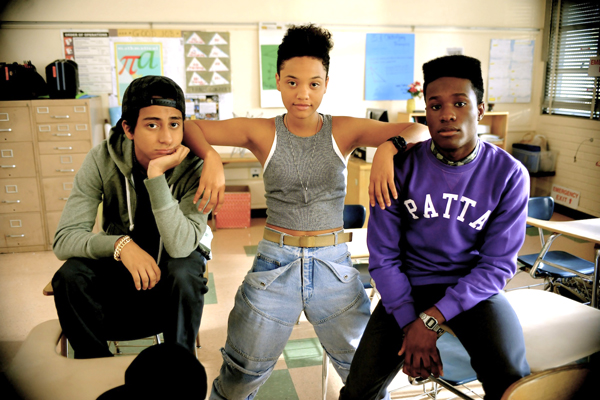
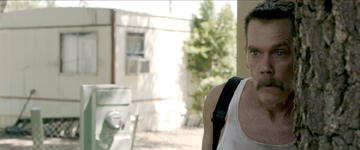
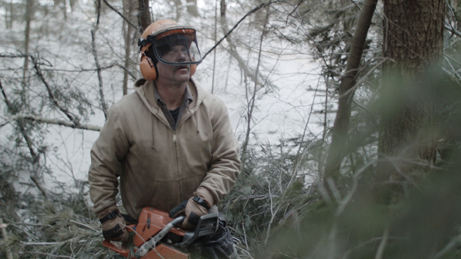


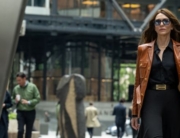

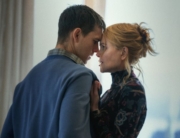










Leave A Comment